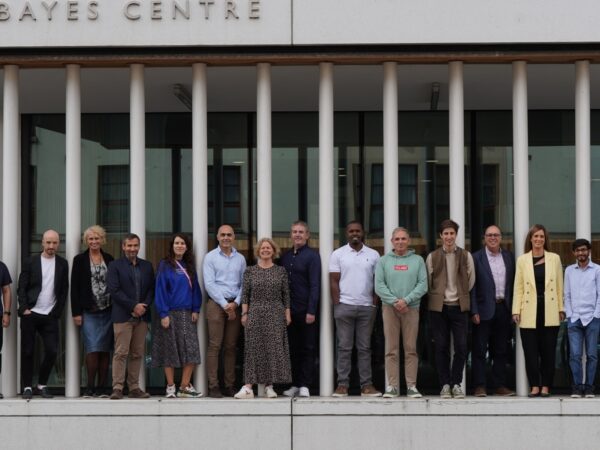
The University is set to establish two research and innovation hubs that will focus on developing AI tools to help revolutionise the fields of electronics and healthcare.
Using AI to develop more efficient semiconductors, design more complex microchips, and improve the early prediction of debilitating diseases are some of the potential outcomes of the £24m funding from the Engineering and Physical Sciences Research Council (EPSRC).
APRIL
The AI Hub for Productive Research and Innovation in Electronics (APRIL) will seek to bring the benefits of AI to the UK electronics industry.
APRIL will develop AI tools to accelerate the development of key components such as new semiconductor materials, complex microchip designs and system architectures – leading to faster, cheaper, greener and overall more power-efficient electronics.
APRIL will be led by Edinburgh’s Regius Chair of Engineering, Professor Themis Prodromakis.

CHAI
The EPSRC AI Hub for Causality in Healthcare AI with Real Data (CHAI) will develop new ways of unearthing important links in complex health data.
CHAI aims to develop AI that can empower decision-making tools to improve challenging tasks such as the early prediction, diagnosis and prevention of disease, and – crucially – to improve the safety of such technology in healthcare.
Researchers hope to apply this new technology to tackle key societal health challenges such as understanding infection, Alzheimer’s, improving cancer treatments, social care, diabetes, and rehabilitation.
CHAI will be led by Edinburgh’s Professor Sotirios Tsaftaris, Canon Medical/RAEng Chair in Healthcare AI.

Both hubs, which will receive £12m each from the EPSRC, are led by academics in the School of Engineering and involve researchers from the School of Informatics, School of Mathematics, the College of Medicine and Veterinary Medicine.
They will be delivered with the Bayes Centre - the University’s innovation hub for data science and AI, with business formation and innovation pipeline support from partners such as Edinburgh Innovations.
Professor Ruth King, Director of the Bayes Centre, one of six Data-Driven Innovation Hubs in the Edinburgh and South East Scotland City Region Deal, said:
As the University of Edinburgh’s Innovation Hub for AI and Data Science, The Bayes Centre provides an exciting and dynamic environment for supporting the AI Hubs.
With many years of experience building an interdisciplinary and cutting-edge tech ecosystem, we work collaboratively across the interface of academia and industry, supporting a community of over 300 companies and, with partners including Edinburgh Innovations, aim to foster the next generation of innovative talent.
The AI Hubs APRIL and CHAI will allow us to focus AI tools and methodologies to address industry specific challenges, in order to innovate solutions, accelerate economic growth, and drive research to respond to global challenges. ”
The hubs have over 70 public and private sector organisations playing an integral part of both the delivery and strategic direction. Organisations interested in finding out more can contact the Bayes Centre at Bayes-Innovations@ed.ac.uk.
The combined investment is further recognition of the University’s world-leading expertise in AI. Edinburgh has a rich heritage in the area. In 1963 it was the first university in Europe to create a research group in AI and computer science.
In late 2023 Edinburgh was announced as the host of three UKRI Centres for Doctoral Training in AI The University will lead in developing the next generation of experts in applying AI to robotics, biomedical innovation and natural language processing.
The University also recently established the Generative AI Laboratory (GAIL), which will push the forefront of generative AI to benefit society and stimulate economic growth.
And the Bridging Responsible AI Divides (BRAID), led by Edinburgh Future Institute’s Professors Shannon Vallor and Ewa Luger has received an additional £9.6 million for a second phase of its programme defining what responsible AI is across sectors.
Professor Sir Peter Mathieson, Principal and Vice-Chancellor of the University of Edinburgh, said:
Successful and ethical applications of AI in healthcare diagnosis and power-efficient electronics could help to address key societal issues, such as our ageing population, global energy use and climate change.
“It is an honour and a great opportunity for our scientists to be leading two of EPSRC’s AI research hubs and I very much look forward to seeing what the future brings in terms of new technologies and innovations in AI. ”
UK Minister for AI Viscount Camrose, said:
The investment we’re pouring into these new projects is only possible as a result of our pro-innovation approach to AI. The AI Regulation White Paper consultation response we’ve set out today will see us forging ahead with that plan, driving forward the next wave of brilliant AI innovations.
These hubs will nurture new, cutting-edge breakthroughs, from healthcare treatments and more power efficient electronics to machine learning and chemical discovery.
New projects being delivered by BRAID will also help to define responsible AI in key sectors such as education, policing, and the creative industries, ensuring public trust in the technology as we continue to harness its capabilities. "
Read more about the AI Hubs on the UKRI website


